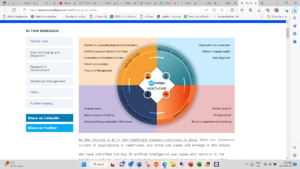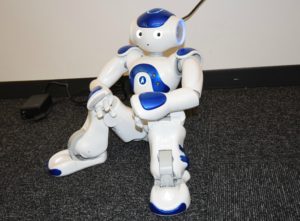AI could be especially useful for patients who live in isolated environments, which can be geographical, mobility limited or even mental health related. When access to in-person healthcare is limited, then interacting with an AI model may increase the level of care. It can also be useful for those for whom finances play a role in accessing healthcare.
Jeremy VanderKnyff, chief integration and informatics office at Proactive MD, says, “Artificial intelligence promises to improve clinical diagnoses, minimize time spent on administrative tasks and support training and education, all of which can optimize patient outcomes”. However, he cautions that health care providers, “find a middle ground where the best of human-touch and advanced technologies thrive”.
“[AI] has been utilized in healthcare for several years. As AI technologies continue to develop and become more sophisticated, we can expect them to play an increasingly significant role in healthcare”, said Michael LeTan at Healthcare Risk Advisors.
And ChatGPT recently passed the US Medical Licensing Examination. As well, it can carry on conversations with patients, and draft emails and letters.
Cem Dilmegani from AI Multiple, in 2022, represented current uses of AI in medicine in this chart.
Bill Farr and his brother, Dr. Peter Farr, run an Indiana addiction medicine practice and are co-founders of Atadas. With the opioid epidemic entering its third decade, they saw a need for better solutions to move patients beyond treatment and into recovery. One of the biggest challenges for addiction health care providers is to ensure compliance. Given COVID-19 challenges with lock downs resulting in patients not being able to visit physicians’ offices, it became even more of a challenge to ensure compliance. These providers’ most serious problems used to be how to keep opioid-use disorder patients in treatment, along with how they are monitored taking medications when they could not visit physician offices. Using AI enabled software, Farr saw a significant increase in compliance. Their use of AI resulted in improved patient care.
Other uses for AI in medicine, including some where the user is not aware of AI, include:
- EHR with integrated AI, including clinical support decision tools, developed to reduce the risk of diagnostic errors
- For interpreting vast amounts of data in images for radiologists
- AI-enhanced surgical robotics for orthopedic surgeries
- Drafting insurance letters and other administrative duties
- Early recognition of sepsis
- Predicting which patients are most likely to be readmitted to hospital
- Supporting decision-making processes in their practices
One example that went viral on TikTok, was Dr. Cliford Stermer’s post where he asked ChatGPT to write a letter to an insurance company to get approval for a patient’s procedure. Not only did ChatGPT write the letter, it also provided references. Since posting the original video, Dr. Sterner has since updated it to advise healthcare professionals to use their own references.
At Toronto’s SickKids hospital, they have an interactive robot called “Medi”. Children interacting with Medi during painful procedures reported less pain and anxiety.
Another use could be facial recognition to confirm identity for medical-legal investigations.
You may also enjoy this AI and Medicine – a TedMed talk by Dr. Bapu Jena as he explores the role of AI in medicine.
Also of interest may be this article in the University of Toronto’s magazine, Healing Power, why AI could be good news for both patients and our healthcare system. It has a focus on Canadian healthcare and AI.
For more articles on Artificial Intelligence, please go to:
- An AI (Artificial Intelligence) Primer
- AI’s Capabilities
- AI Achievements
- ChatGPT (or any AI bot) and Your Medical office
- Teaching AI in Medical School
- Patient Trust in AI Chatbots & ChatGPT
- Competitors to ChatGPT
- AI Policies and Regulatory Challenges
- Ai Bias
- AI’s Limitations, Concerns and Threats
- What AI Can’t and Shouldn’t Do
- AI and Accountability
- The Dangers of AI
- The Future of Generative AI
- AI and Medicine
2Ascribe Inc. is a medical and dental transcription services agency located in Toronto, Ontario Canada, providing medical transcription services to physicians, specialists (including psychiatry, pain and IMEs), dentists, dental specialties, clinics and other healthcare providers across Canada. Our medical and dental transcriptionists take pride in the quality of your transcribed documents. WEBshuttle is our client interface portal for document management. 2Ascribe continues to implement and develop technology to assist and improve the transcription process for physicians, dentists and other healthcare providers, including AUTOfax. AUTOfax works within WEBshuttle to automatically send faxes to referring physicians and dentists when a document is e-signed by the healthcare professional. As a service to our clients and the healthcare industry, 2Ascribe offers articles of interest to physicians, dentists and other healthcare professionals, medical transcriptionists, dental transcriptionists and office staff, as well as of general interest. Additional articles may be found at http://www.2ascribe.com. For more information on Canadian transcription services, dental transcription, medical transcription work or dictation options, please contact us at info@2ascribe.com.



